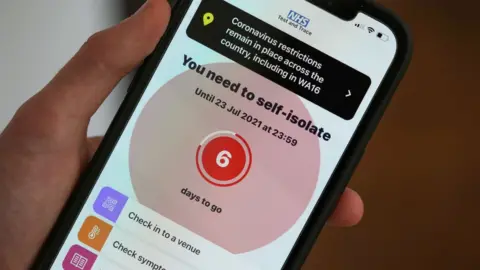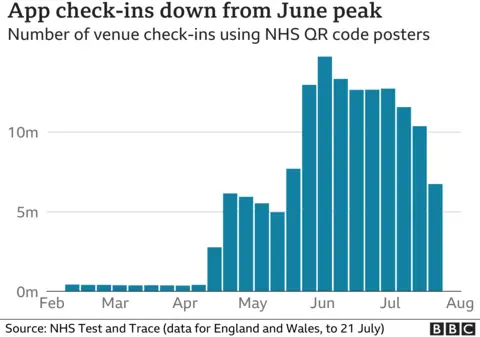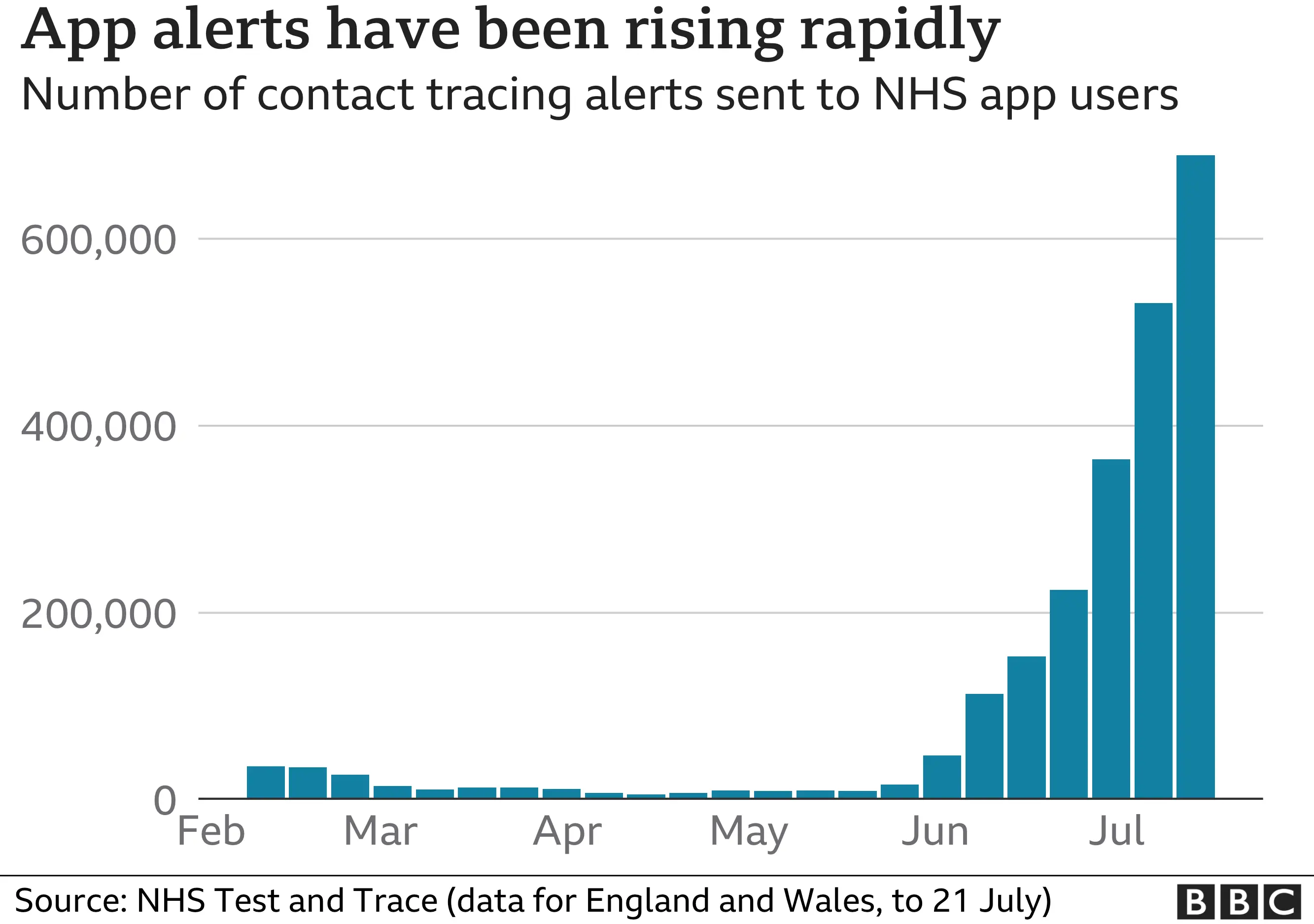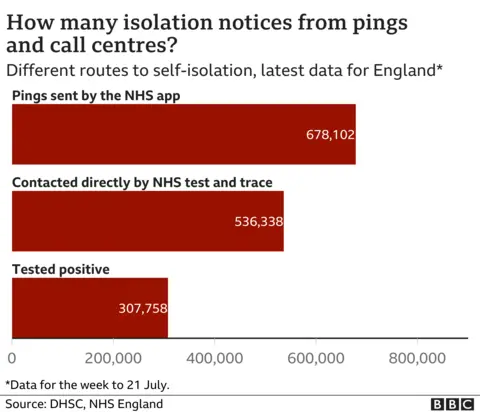NHS Covid-19 app pings rise by over 70,000 to new record
 Christopher Furlong
Christopher FurlongThe number of self-isolation alerts sent by the NHS Covid-19 app in England and Wales has risen to a new record of 689,313 in the week up to 21 July.
The figures represent an increase of over 70,000 compared with the previous week.
But the rate of increase was lower than the previous week, rising by 11% compared to 17%.
If you are "pinged" by the app you are advised - but not legally obliged - to self-isolate for 10 days.
However the government has said it is crucial for people to do so.

In recent weeks, there has been widespread criticism that the app has been sending out so many alerts that hundreds of thousands of people are self-isolating and missing work, causing widespread disruption.
It led to the government allowing some key workers - such as those working in food distribution - to be exempt from having to self-isolate if pinged. Instead they have to take daily tests.
There are currently 260 testing sites open for these workers, Downing Street said on Thursday - and they are working to set up another 800. After that, 1,200 more sites will be opened "over the coming days".
From 16 August, all fully-vaccinated people will not need to self-isolate if pinged by the app, although they will be encouraged to book a Covid PCR test.
The impact on businesses has resulted in calls for the 16 August deadline to be brought forward.

The Society of Motor Manufacturers and Traders is asking for urgent assistance to exempt staff pinged by the NHS Covid app saying pings are affecting production.
Many in the hospitality industry also complained of shortages as staff had to self-isolate. Some bar staff have told the BBC that they've lost a lot of money by missing shifts, while others say they have been told to delete the app by their manager.
The app alert is advisory only and not enforceable by law, unlike a phone call from the NHS Test and Trace team.
Latest data from Test and Trace shows that 14% of cases transferred to contact-tracers in the week to 21 July were not reached and so were unable to provide details of close contacts.
This is the highest proportion of people not reached since October last year.
England's deputy chief medical officer Prof Jonathan Van Tam said separate figures from Public Health England showed the vaccines have now prevented 22 million Covid cases and 60,000 deaths. He added it was "truly massive".


If you were looking for evidence that the "pingdemic" is over you will struggle to find it in these statistics. The figure of nearly 690,000 contact tracing alerts - or pings - is a new record, up 11% on the previous week. They were triggered by nearly 148,000 positive test results entered in the app, up 25%.
Despite the anecdotal evidence of people switching off or getting rid of the app, there is no sign yet of mass deletions.
But there are a few straws in the wind suggesting things might be changing. The rate of increase in pings slowed, and the number of alerts triggered by each positive test result was down. That suggests that people who later became infected had fewer close contacts - either because they were socialising less or because those they encountered did not have the app.
In the week when restrictions in England were relaxed so that venues did not need to record visitors' details, check-ins via the app were sharply lower.
As they find they don't need it to check in, more people may decide the app is more trouble than it's worth.
But the team which designed it believes the NHS Covid-19 app is changing behaviour in useful ways - even if someone ignores a ping's instruction to self isolate they may become more cautious, and anyone who has a holiday planned may be nudged into staying at home for a few days beforehand rather than having their plans spoiled by an alert.
At first, it was criticised for being ineffective, in recent weeks it's been accused of disrupting thousands of businesses, but its designers believe this experimental technology is finally proving that it can be a useful weapon in controlling the pandemic.


After a week of falling cases the number of people testing positive for coronavirus rose on Wednesday, when 27,734 new daily cases were reported.
Health Secretary Sajid Javid said: "The truth is, when it comes to case numbers no one really knows where they are going to go next".

How does the NHS Covid app work?
People in England and Wales can download the NHS Covid app (Northern Ireland and Scotland have their own).
If you are using the app and spend enough time close to another person with it, you will receive a "ping" alert if they later test positive for Covid-19 and share the information with the app. The app uses the Bluetooth signal to determine whether your phone had recently been within 2m of theirs for at least 15 minutes.
If you are "pinged" you're advised - but not legally obliged - to self-isolate for up to 10 days.

Separately to the NHS Covid app, there have also been changes to the NHS app, which among other things is used for Covid vaccination records.
It has been updated to allow iPhone and iPad users to store their Covid Pass using the Apple Wallet app.
This can be used at events and venues in England, but not for international travel the government says.

- "THE STIGMA AND NEGATIVITY": The Tricky podcast discuss what it's like living with HIV and the level of information out there
- "MENTAL AND PHYSICAL HEALTH ARE EQUALLY IMPORTANT": How Simone Biles is changing attitudes

